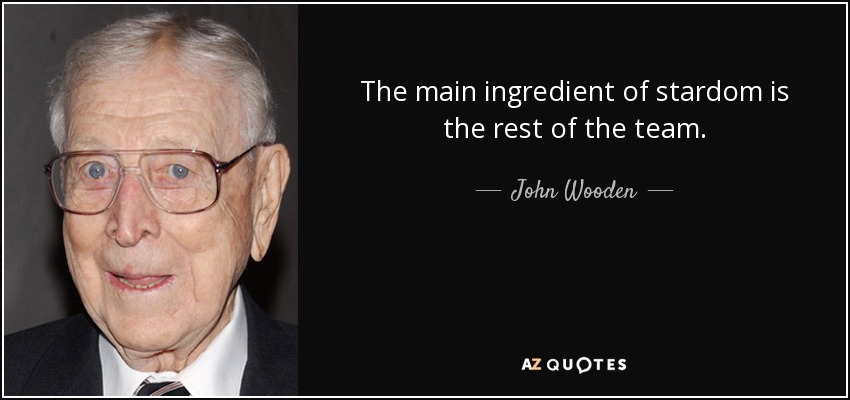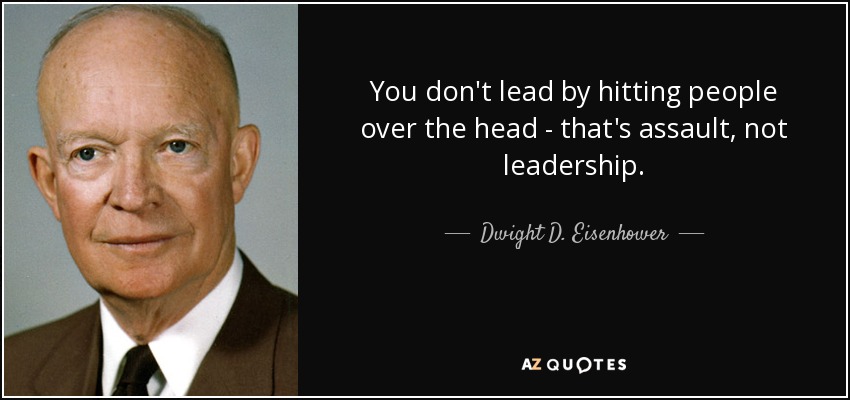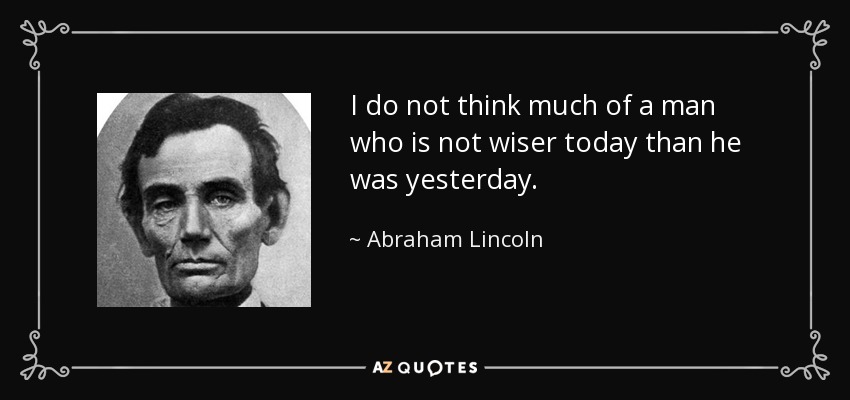Click here to return to Blog Post Intro

What Happens When Bosses Don’t Lead?
- Decisions are delayed: Not all good decision makers are leaders, but all good leaders are decision makers.
- Agendas are multiplied: When a group of people comes together and no one is clearly the leader, then individuals begin to follow their own agendas. Before long, all the people are doing their own thing. Teams need leadership to provide a unifying voice.
- Conflicts are extended: One of the most important roles of a leader is conflict resolution. In the absence of clear leadership, conflicts always last longer and inflict more damage. Often it takes a good leader to step up, step in, and bring everyone to the table to work things out. Leaders must always be ready to do what it takes to help people resolve their conflicts.
- Morale becomes low: When leaders are not present or not leading, people often lose hope and morale plummets. Why is that? Because morale can be defined as “faith in the leader at the top.”
Leaders need to do their best to keep people with a different vision—especially a destructive one—from rushing in and filling the void created by their leader.
Russian writer Leo Tolstoy began his novel Anna Karenina this way: “Happy families are all alike; every unhappy family is unhappy in its own way.” A similar idea can be expressed about leaders. All good leaders share many characteristics, but bad leaders come in quite a few varieties. Consider these characteristics of poor leadership:
- Insecure Leaders are like the company president who is reported to have sent a memo to the personnel manager with the following message: “Search the organization for alert, aggressive young leaders capable of stepping into my shoes. And when you find them—fire them!”
- Visionless Leaders create two immediate problems for the people who work for them. First, they fail to provide direction or incentive to move forward. Second, they almost always lack passion. They have no fire.
- Incompetent Leaders are “lids” on the parts of the organization they lead. The Law of the Lid in The 21 Irrefutable Laws of Leadership states “Leadership ability determines a person’s level of effectiveness.” (See my post, honoring a significant lid-lifter in my life.)
- Self-centered leaders attempt to advance at the expense of everyone around them. Share whatever you have with the people below you, and they will work harder for you.
- Chameleon Leaders: President Lyndon Baines Johnson used to tell the story of a young, unemployed schoolteacher who came to the Texas hill country during the Depression in search of a job. When the local school board asked him whether the world was round or flat, the would-be teacher panicked, fearing a trap, and blurted out, “I can teach it both ways!”
- Political leaders are motivated by the desire to get ahead. It’s hard to follow people whose decisions are based on political ambitions rather than the mission, the good of the organization, or the well-being of the people.
- Controlling Leaders: Have you ever worked for someone who wants to be in the middle of everything you do? Few things are more frustrating for a competent person. People who micromanage others are often driven by one of two things: the desire for perfection, which is unobtainable, or the belief that no one can do a job as well as they can, which really boils down to their thinking others’ contributions aren’t as valuable as their own.
You need to realize that the stronger your natural desire to initiate, the greater the potential for tension and conflict with a weak leader.
Few things can be more maddening than working for an ineffective leader. But you can’t control your leader. You have no control over anyone but yourself. So that’s where you need to start.
Lead Yourself Well Before Anything Else
Nothing will make a better impression on your leader and those you work with than your ability to lead yourself well.
If you want to gain credibility with your boss and others, focus on taking care of business in these seven areas:
1. Manage Your Emotions
Sometimes showing your emotions to people is good because it helps others know what you’re feeling. It can fire them up. Other times you need to hold your feelings in check.
2. Manage Your Time
Here are two ideas that may help you manage your time better. First, every day determine which tasks are most important, and do them first. Second, ask yourself how much time a given task is worth before you start it, and then try to complete it in that time frame.
3. Manage Your Priorities
Try to get yourself to the point where you can manage your priorities and focus your time in this way:
- 80 percent of the time—work where you are strongest
- 15 percent of the time—work where you are learning
- 5 percent of the time—work in other necessary areas
4. Manage Your Energy
Consider “the ABCs energy-drain.”
- Activity Without Direction—doing things that don’t seem to matter
- Burden Without Action—not being able to do things that really matter
- Conflict Without Resolution—not being able to deal with what’s the matter
Do your most important work when you’re at your best: when your energy is high and your mind is sharp.
5. Manage Your Thinking
The greatest enemy of good thinking is busyness.
6. Manage Your Words
7. Manage Your Personal Life
You can do everything right at work and manage yourself well there, but if your personal life is a mess, it will eventually turn everything else sour. What would it profit a leader to climb to the top of the organizational chart but to lose a marriage or alienate the children?
For years one of Maxwell’s definitions of success has been this: “having those who are closest to me love and respect me the most.”
While self-management is basically having the discipline to follow through with the rules you set for yourself, leadership is about taking things forward. Often that means learning to think outside the box.
Business professor, consultant, and leadership guru Warren Bennis said, “A part of whole-brain thinking includes learning to trust what Emerson called the ‘blessed impulse,’ the hunch, the vision that shows you in a flash the absolutely right thing to do. Everyone has these visions; leaders learn to trust them.” Begin to pay attention to your instincts. If you get a gut feeling about somethings that’s wrong or the source of a problem, quietly pay attention to see what happens.
To be a better leader, look for good people, and invest in them to the point where they can be released and empowered to perform.
Leadership is a moving target, and it always will be. If you desire to become better at leading yourself, get comfortable with change. People who maintain a great attitude pay more attention to production than to promotion. If you consistently “deliver the goods,” as poet Walt Whitman put it, you may eventually be noticed.
Tim Sanders, author of Love Is the Killer App, says there are plenty of resources, credit, and opportunities to go around. In fact, he believes that a scarcity mind-set is at the root of most conflict.
Good leadership always gets noticed. Legendary Green Bay Packer football coach Vince Lombardi said, “Some of us will do our jobs well, and some will not. But we will all be judged by only one thing—the result.”
Find Ways to Work With Your Boss
1. Develop a genuine relationship with your boss
Build a relational bridge. Try to get to know him or her. Find common ground.
2. Identify and appreciate your boss’ strengths
3. Commit yourself to adding value to those strengths
4. Find ways to complement your boss’ weaknesses
Wise leaders not only leverage their strengths, but they also staff their weaknesses.
5. Expose your leader to good leadership resources
6. Publicly affirm your leader
BUILD RELATIONAL CHEMISTRY
It is leaders’ responsibility to connect with the people they lead.
1. Listen to your boss’ heartbeat
Just as a doctor listens to someone’s heartbeat to know that person’s physical condition, you need to listen to your boss’s heartbeat to understand what makes him or her tick.
2. Know your boss’ priorities.
3. Catch your boss’ enthusiasm
4. Try to support your boss’ vision
5. Connect with your boss’ interests
6. Understand your boss’ personality
7. Earn your boss’ trust
8. Learn to work with your boss’ weaknesses
Sales expert and author Les Giblin said, “You can’t make the other fellow feel important in your presence if you secretly feel that he is a nobody.”
9. Respect your boss’ family
People can usually trace their successes and failures to the relationships in their lives. Maxwell believes that so sincerely, he made it the thesis of his book, Winning with People. (For a summary of Maxwell’s first book about relationships, check out Be a People Person.)
At the same time that you are developing relational chemistry, there’s another thing you can do to help your boss: reduce their load.
A Chinese proverb says, “Those who drink the water must remember those who dug the well.” Gratitude is one of the most attractive of all personal attributes; sometimes I think it is one of the least practiced.
HOW TO LIFT YOUR BOSS’S LOAD
1. Start by consistently doing your own job well
Hall of Fame baseball player Willie Mays said, “It isn’t hard to be good from time to time in sports. What’s tough is being good every day.”
2. Any time you find a problem, provide a solution
3. Tell your boss what he needs to hear with tact
Sales expert Burton Bigelow said, “Very few big executives want to be surrounded by ‘yes’ men. Their greatest weakness often is the fact that ‘yes’ men build up around the executive a wall of fiction, when what the executive wants most of all is plain facts.”
4. Go the Second Mile
5. Stand up for your boss whenever you can
Former army general and U.S. secretary of state Colin Powell said, “When we are debating an issue, loyalty means giving me your honest opinion, whether you think I’ll like it or not. Disagreement, at this stage, stimulates me. But once a decision has been made, the debate ends. From that point on, loyalty means executing the decision as if it were your own.”
6. Stand in for your boss whenever you can
7. Ask your boss how you can lift the load
Develop Your Influence Wherever You Are
WHY PEOPLE OFTEN WAIT TO DEVELOP INFLUENCE
1. The Destination Myth: “When I become the boss, I’ll start learning to lead.”
You need to learn as much as you can about leadership before you have a leadership position. You need to start developing your influence before you need it.
2. The Inexperience Myth: “When I’m the boss, I’ll be able to control what happens.”
As Andy Stanley said, “If you’re a leader and leaders work for you, they think they can do a better job than you. They just do (just like you do). And that’s not wrong; that’s just leadership.”
3. The Freedom Myth: “When I become the boss, I’ll do what I want.”
4. The Potential Myth: “I can’t reach my potential until I’m the boss.”
People should strive for the top of their game, not the top of their organization. Each of us should work to reach our own potential, not necessarily the corner office.
5. The All-or-Nothing Myth: “If I can’t be the boss, then there’s no point in trying to lead.”
If you keep developing your influence and growing your leadership, you will probably get your opportunity to lead at a higher level. You will move from being today’s worker to tomorrow’s leader.
Leadership expert Max DePree said, “Succession is one of the key responsibilities of leadership.” That is true. There is no success without a successor.
Protestant reformer John Knox said, “You cannot antagonize and influence at the same time.”
WHAT TO EXPECT ON THE INFLUENCE JOURNEY
1. Leadership is a journey that starts where you are, not where you want to be
Award-winning sportswriter Ken Rosenthal said, “Each time you decide to grow again, you realize you are starting at the bottom of another ladder.”
2. Leadership skills are similar, but the “League of Play” changes
3. Greater responsibilities come only after handling smaller ones well
All good leadership begins where you are. The small responsibilities you have before you now comprise the first great leadership conquest you must make.
4. Leading at your current level creates your resume for going to the next level
When Maxwell interviews someone for a job, he puts 90 percent of the emphasis on the track record. If you want to get the chance to lead on another level, then your best chance for success is to lead well where you are now.
5. When you can lead volunteers well, you can lead almost anyone
Donald McGannon, former CEO of Westinghouse Broadcasting Corporation, stated: “Leadership is action, not position.” Taking action—and helping others to do the same in a coordinated effort—is the essence of leadership.
Avoid Landmines That Could Make Your Situation Worse
There’s no guarantee that things will get better. But things can get worse.
When you’re working for a bad boss, it’s easy to feel frustrated and discontented. However, it’s essential that you maintain a sense of positive contentment despite the challenges if you want to be successful. Remember that in the long run, success is more a matter of disposition than position.
1. Develop strong relationships with key people
2. Engage in continual communication
3. Gain experience and maturity
Humorist Arnold Glasow said, “The key to everything is patience. You get the chicken by hatching the egg—not smashing it.”
4. Put the team above your personal success
Some working environments seem to draw people toward political behavior. To avoid such difficulties, do the following:
1. Avoid gossip
It’s been said that great people talk about ideas, average people talk about themselves, and small people talk about other people. Never vent about your boss to others to make yourself feel better.
2. Stay away from petty arguments
As the saying goes, a bulldog can beat a skunk in a fight anytime, but he knows it’s just not worth it.
3. Stand up for what’s right, not just for what’s popular
How do you know when to stand up and when not to, especially in our culture where many people see truth as subjective? Use the Golden Rule: in everything, do to others what you would have them do to you.
4. Look at all sides of an issue
Consider this tongue-in-cheek piece of business advice: before you have an argument with your boss, take a good look at both sides—his side and the outside.
5. Don’t protect your turf
6. Say what you mean, and mean what you say
NEVER MAKE YOUR BOSS FEEL LIKE YOU’RE WASTING HER TIME
1. Invest 10X
Charles C. Gibbons advised, “One of the best ways to save time is to think and plan ahead; five minutes of thinking can often save an hour of work.”
2. Don’t make your boss think for you
3. Bring something to the table
4. If asked to speak, don’t wing it
Former world championship boxer Joe Frazier said: “You can map out a fight plan or a life plan. But when the action starts, you’re down to your reflexes. That’s where your roadwork shows. If you cheated on that in the dark of the morning, you’re getting found out now under the bright lights.”
5. Get to the bottom line
KNOW WHEN TO PUSH . . .
1. Do I know something my boss doesn’t but needs to?
2. Is time running out?
There’s an old saying, “Better one word in time than two afterward.” If that was true in ages past, it is even more applicable today in our fast-paced society where information and markets move so quickly.
3. Are my responsibilities at risk?
4. Can I help my boss win?
. . . AND WHEN TO BACK OFF
If you’re not sure whether it’s time to back off, ask these six questions:
1. Am I promoting my own personal agenda?
2. Have I already made my point?
3. Must everyone but you take the risk?
4. Does the atmosphere say “no”?
5. Does my request exceed the relationship?
Prove Your Worth Daily and Never Stop Growing
Few things speak more loudly than excellence at one’s craft. Ralph Waldo Emerson is believed to have said, “If a man can write a better book, preach a better sermon or make a better mouse trap than his neighbors, though he builds his house in the woods, the world will make a beaten path to his door.” If you become excellent at what you do, others notice, and they will seek you out. Expertise always has value.
What can you do every day to help you become better at your core competency?
1. Learn your craft today
On a wall in the office of a huge tree farm hangs a sign. It says, “The best time to plant a tree is twenty-five years ago. The second-best time is today.”
2. Talk about your craft today
Talking to peers is wonderful, but if you don’t also make an effort to strategically talk your craft with those ahead of you in experience and skill, then you’re really missing great learning opportunities.
3. Practice your craft today
An aid group in South Africa once wrote to missionary and explorer David Livingstone asking, “Have you found a good road to where you are? If so, we want to know how to send other men to join you.” Livingstone replied, “If you have men who will come only if they know there is a good road, I don’t want them. I want men who will come even if there is no road at all.”
Few things gain the respect of a boss, a team, and the top leaders of an organization more quickly than someone with a whatever-it-takes attitude.
Here are the top things you can do to become the kind of person others look to:
1. Take the tough jobs
2. Pay your dues
3. Be willing to work in obscurity
English novelist and poet Emily Brontë said, “If I could, I would always work in silence and obscurity, and let my efforts be known by their results.”
4. Succeed with difficult people
5. Put yourself on the line
6. Admit faults but never make excuses
It’s easier to move from failure to success than from excuses to success.
7. Be the first to step up and help
8. Take responsibility for your responsibilities
9. Perform tasks that are “not your job”
BECOME YOUR BOSS’S GO-TO PRODUCER
1. Produce when the pressure’s on
2. Produce when the resources are few
3. Produce when the momentum is low
Organizations have only three kinds of people when it comes to momentum:
- Momentum Breakers—people who sabotage the leaders and organization and who sap momentum as a result (bottom 10 percent of the organization).
- Momentum Takers—people who merely take things as they come (middle 80 percent).
- Momentum Makers—the people who move things forward and create momentum (top 10 percent).
4. Produce when the load is heavy
5. Produce when the leader is absent
6. Produce when the time is limited
Consider a sign Maxwell once saw at a small business called “The 57 Rules to Deliver the Goods.” Beneath the title it read:
- Rule #1: Deliver the Goods
- Rule #2: The other 56 don’t matter
That’s the philosophy of go-to producers. They deliver no matter how tough the situation is.
MAINTAINING YOUR BALANCE AS YOU PROVE YOUR WORTH
How do you accomplish all this with grace, tact, and calm?
1. Find a way to relieve stress
2. Know what to “own” and what to let go
One of the best things you can do is ask your boss what is expected of you. But you can’t expect one conversation to settle the issue.
Maintain an ongoing dialogue concerning your boss’s expectations, and do your best to own what you must, and let go of what you can’t or shouldn’t do.
3. Never violate the trust of your boss
By focusing on growth, you become wiser each day. And your leadership continues to improve.
What kind of a plan have you put yourself on to keep growing?
Indian reformer Mahatma Gandhi said, “The difference between what we do and what we are capable of doing would suffice to solve most of the world’s problems.”
If you want to influence your team, your boss, and the people at the top of your organization—and keep influencing them—then you need to keep getting better.
Founding father Ben Franklin said, “By improving yourself, the world is made better. Be not afraid of growing too slowly. Be afraid only of standing still. Forget your mistakes but remember what they taught you.”
To be better tomorrow, become better today.










